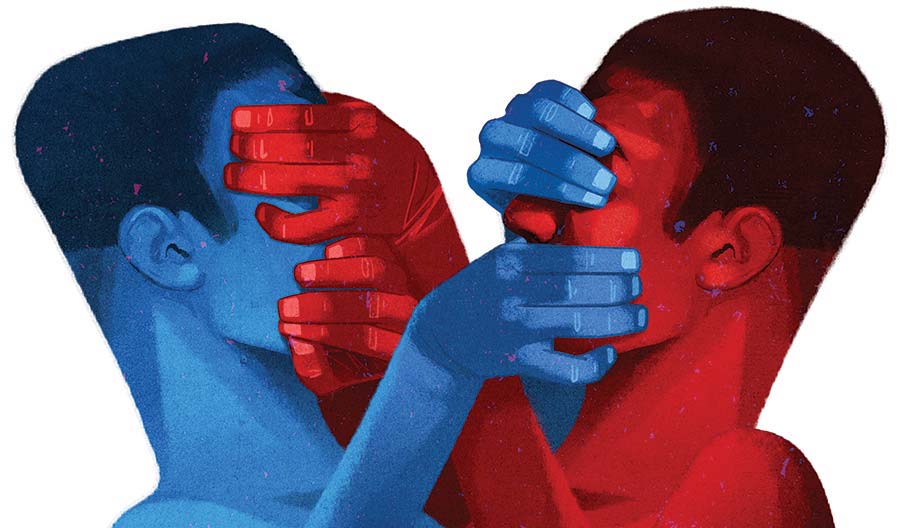
In today’s rapidly shifting cultural landscape, the boundaries between ‘us’ and ‘them’ are increasingly blurred, yet polarization continues to shape behavior in profound ways. Male behavior, in particular, is affected—altering personal relationships, career decisions, and overall lifestyle. In a world where traditional expectations clash with modern realities, many men experience inner conflicts. This article explores the deep roots of polarization, examines how it manifests in male conduct, and offers practical strategies to overcome its divisive effects. By understanding these dynamics, you will be empowered to create more meaningful connections and lead a more balanced life.
The Roots of Polarization in Modern Society
Polarization is not a new phenomenon, but its intensity has surged in recent times. Rapid technological advancements, the rise of social media, and evolving political narratives have created a fertile ground for amplified opinions and heightened differences. The fusion of historical trends with modern innovations weaves a complex fabric of ideologies that impacts male behavior directly.
Traditional views of masculinity often clash with emerging progressive narratives, creating an inner conflict for many men. Media, politics, and cultural influencers frequently present binary choices that force individuals to adopt extremes, reinforcing stereotypes and making it harder to carve out a balanced identity.
Recent studies indicate that many men find themselves trapped in the crossfire of ideological battles. They face the dual pressure of conforming to outdated roles while also striving to embrace new societal expectations. This internal struggle not only affects interpersonal relationships but also shapes broader lifestyle trajectories and personal fulfillment.
Manifestations of Polarized Behavior in Men

When polarization takes hold, its effects on behavior are both noticeable and varied. Faced with the pressure to prove their worth, many men gravitate toward extreme positions that reinforce their identity. Whether aligning with a political view or navigating social interactions, the battle between conviction and chaos becomes evident. Men increasingly display behaviors that highlight these divisive realities, ranging from overt aggression to deep-seated internal anxiety.
This section examines the different ways polarized behavior shows itself in men. From workplace dynamics and political discourse to subtle cues in everyday interactions, polarization can foster miscommunication and isolation. Often, men retreat into echo chambers where their views are constantly validated, further deepening the divide.
Additionally, social media acts as a powerful catalyst. Algorithms that favor strong, divisive opinions tend to reinforce extreme views, normalizing radical mindsets. This trend not only colors public debates but also influences intimate personal decisions.
Social Media as an Amplifier
Social media platforms are pivotal in molding personal traits and group identities amid polarization. The unrelenting exposure to selective news and targeted ads solidifies pre-existing biases, often pushing men toward radical stances as a form of defense.
This digital echo chamber isolates individuals from diverse perspectives, making it easier for polarized communities to thrive. The impact is visible both online and offline, where confrontations replace constructive dialogue.
The Role of Traditional Media
Traditional media, though less personalized than social networks, continues to shape perceptions by offering curated content that caters to specific audiences. This often leads to a simplistic, binary portrayal of complex issues, deepening division.

When conflict is highlighted over consensus in news programs and talk shows, men may develop a narrow understanding of societal dynamics, feeling compelled to align strictly with one side at the expense of nuance and empathy.
Impact on Lifestyle and Personal Growth
The influence of polarization reaches far beyond politics and social debates—it permeates the very fabric of our lifestyles and personal growth. For men, the stress of managing conflicting societal roles can trigger significant inner turmoil, affecting mental health, career paths, and family relationships. The repercussions are both widespread and deeply personal.
Many men find themselves straddling ambitious professional goals and enduring traditional expectations. This constant tug-of-war can impose a heavy psychological burden, causing one’s self-identity to be continuously questioned by external pressures. The path to self-realization becomes fraught with obstacles that are more about societal demands than individual capability.
Research and personal accounts reveal a marked increase in anxiety, depression, and other stress-related issues among men. Contributing factors include relentless societal expectations, continuous exposure to conflict-laden content, and a scarcity of supportive networks that encourage a more balanced self-image.
Strategies for Navigating and Overcoming Polarization
Addressing polarization demands a multidimensional approach, especially for men immersed in today’s divided world. Effective strategies start with self-awareness and extend to broader societal changes. Understanding and navigating bias is key to forging a balanced and fulfilling life.

A crucial step towards overcoming polarization is creating an environment that values empathy and open dialogue. Men are encouraged to engage with diverse communities and invite conversations that challenge their assumptions. This journey of self-discovery can spark both personal and social transformation.
Practical measures include developing emotional intelligence, seeking professional guidance when needed, and building supportive networks that nurture respectful discussion. By embracing these actions, men can reduce the negative effects of polarization and work towards a more harmonious existence.
Practical Techniques to Build Resilience
Building resilience is essential for men facing polarized environments. Techniques such as mindfulness, cognitive behavioral practices, and regular self-reflection offer a robust foundation for mental well-being.
Support groups and therapy sessions provide safe spaces to share vulnerabilities and exchange personal strategies, strengthening emotional resilience against societal pressures.
Fostering Inclusive Communities
Inclusive communities that welcome diverse opinions are vital in reducing polarization. Local initiatives and online groups promoting respectful dialogue can create environments of mutual support.
Participation in community events and cultural projects contributes to improved mental health and personal satisfaction. Embracing diversity allows men to redefine strength and support in modern society.
Future Perspectives and Call to Action
Looking to the future, male behavior in the context of polarization holds exciting opportunities for positive change. As societal structures evolve, the definitions of masculinity and success are also transforming. Embracing these changes can lead to a more balanced interplay between tradition and progress. New possibilities await those willing to adapt and grow.
Emerging research indicates a gradual shift as more men prioritize mental and emotional well-being over rigid adherence to outdated norms. Educational initiatives and progressive policy changes that champion open-mindedness are poised to drive this transformation. Influencers, thought leaders, and grassroots movements are playing an increasingly important role in reshaping future paradigms.
The call to action for men today is clear: recognize the forces shaping your life, engage in dialogues that dismantle stereotypes, and support reforms that promote unity. Every step toward self-empowerment contributes to a healthier, more inclusive society.

Content Additional
To further expand on these insights, this section delves deeper into the nuances of polarization and its varied impact on male behavior. Bridging the gap between modern expectations and traditional roles is essential, and it requires rethinking the way society frames masculinity. Experts emphasize that encouraging emotional vulnerability can open up opportunities for both personal and community growth, challenging outdated gender stereotypes.
Research from leading institutions shows that integrating emotional intelligence into daily life significantly reduces stress and enhances overall life satisfaction. Programs like peer-support networks, which focus on mental health discussions, have successfully broken down long-standing barriers. This shift toward emotional openness not only alleviates the pressures of societal expectations but also fosters healthier interpersonal relationships.
The digital age brings its own set of challenges and opportunities. While the rapid spread of misinformation on social media can deepen extremist ideologies, these platforms also offer a chance for balanced, fact-based discussions. Online forums, webinars, and virtual workshops provide spaces where men can exchange diverse perspectives and hone the critical thinking skills needed to navigate polarized environments.
Education also plays a pivotal role in mitigating the negative effects of polarization. Curriculums that include digital literacy, critical news analysis, and empathy training equip students with the tools to challenge divisive narratives effectively. Empowering younger generations with these skills initiates a ripple effect towards a more united society.
The discussion on polarization and its impact on male behavior reveals complex interconnections between personal growth, societal structures, and modern identity. Recognizing these challenges is the first step toward meaningful change. As men navigate between personal beliefs and a broader global perspective, practicing empathy and self-awareness becomes imperative. Embracing change, questioning assumptions, and engaging in open dialogue can help build a more inclusive and constructive future in both personal and professional realms.